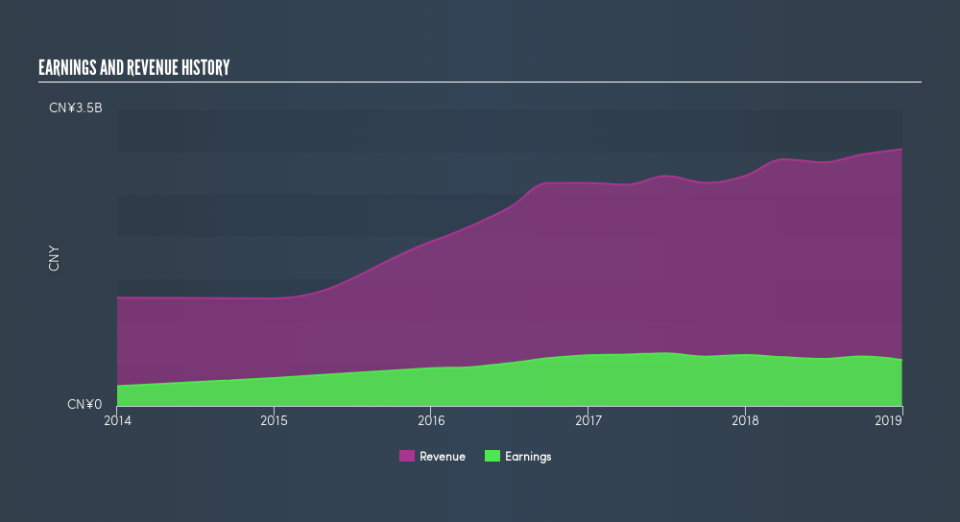China Jinjiang Environment Holding Company Limited (SGX:BWM): What Does Its Beta Value Mean For Your Portfolio?

Want to participate in a research study? Help shape the future of investing tools and earn a $60 gift card!
If you're interested in China Jinjiang Environment Holding Company Limited (SGX:BWM), then you might want to consider its beta (a measure of share price volatility) in order to understand how the stock could impact your portfolio. Modern finance theory considers volatility to be a measure of risk, and there are two main types of price volatility. The first type is company specific volatility. Investors use diversification across uncorrelated stocks to reduce this kind of price volatility across the portfolio. The other type, which cannot be diversified away, is the volatility of the entire market. Every stock in the market is exposed to this volatility, which is linked to the fact that stocks prices are correlated in an efficient market.
Some stocks mimic the volatility of the market quite closely, while others demonstrate muted, exagerrated or uncorrelated price movements. Beta can be a useful tool to understand how much a stock is influenced by market risk (volatility). However, Warren Buffett said 'volatility is far from synonymous with risk' in his 2014 letter to investors. So, while useful, beta is not the only metric to consider. To use beta as an investor, you must first understand that the overall market has a beta of one. A stock with a beta below one is either less volatile than the market, or more volatile but not corellated with the overall market. In comparison a stock with a beta of over one tends to be move in a similar direction to the market in the long term, but with greater changes in price.
View our latest analysis for China Jinjiang Environment Holding
What BWM's beta value tells investors
China Jinjiang Environment Holding has a five-year beta of 1.03. This is reasonably close to the market beta of 1, so the stock has in the past displayed similar levels of volatility to the overall market. While history does not always repeat, this may indicate that the stock price will continue to be exposed to market risk, albeit not overly so. Beta is worth considering, but it's also important to consider whether China Jinjiang Environment Holding is growing earnings and revenue. You can take a look for yourself, below.
Does BWM's size influence the expected beta?
China Jinjiang Environment Holding is a small company, but not tiny and little known. It has a market capitalisation of S$830m, which means it would be on the radar of intstitutional investors. Small companies often have a high beta value because the stock price can move on relatively low capital flows. So it's interesting to note that this stock historically has a beta value quite close to one.
What this means for you:
China Jinjiang Environment Holding has a beta value quite close to that of the overall market. That doesn't tell us much on its own, so it is probably worth considering whether the company is growing, if you're looking for stocks that will go up more than the overall market. In order to fully understand whether BWM is a good investment for you, we also need to consider important company-specific fundamentals such as China Jinjiang Environment Holding’s financial health and performance track record. I urge you to continue your research by taking a look at the following:
Future Outlook: What are well-informed industry analysts predicting for BWM’s future growth? Take a look at our free research report of analyst consensus for BWM’s outlook.
Past Track Record: Has BWM been consistently performing well irrespective of the ups and downs in the market? Go into more detail in the past performance analysis and take a look at the free visual representations of BWM's historicals for more clarity.
Other Interesting Stocks: It's worth checking to see how BWM measures up against other companies on valuation. You could start with this free list of prospective options.
We aim to bring you long-term focused research analysis driven by fundamental data. Note that our analysis may not factor in the latest price-sensitive company announcements or qualitative material.
If you spot an error that warrants correction, please contact the editor at editorial-team@simplywallst.com. This article by Simply Wall St is general in nature. It does not constitute a recommendation to buy or sell any stock, and does not take account of your objectives, or your financial situation. Simply Wall St has no position in the stocks mentioned. Thank you for reading.

 Yahoo Finance
Yahoo Finance 
